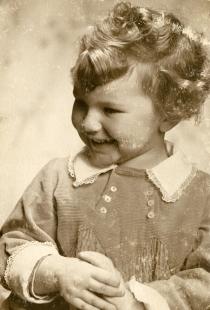Opposite our house in Lagiewniki [a Cracow suburb] was a convent [the Congregation of the Sisters of Our Lady of Mercy], but at that time [during World War I; 1914-1918], there was a hospital in that convent run by the nuns. As the festival of Pesach was drawing near in 1915, and Grandfather was a devout Jew, and wealthy, he invited the invalid Austrian Jewish soldiers from the convent to spend the holidays with him.
Dinner was served outside, in the summerhouse. They couldn't take the photograph in the summerhouse, because it was too dark, they took the table outside - even the tablecloths weren't laid straight, in a hurry, while it was still light. Yes. Behind the table, on the wooden wall of the summerhouse, hung a portrait of the Austrian emperor, Franz Joseph. Well, it was Austria, and Grandfather was a loyal subject. The Jews prospered under Austria. In the center sat my grandfather, this gray-bearded Jew with short peyot and a hat, and all around him soldiers. My grandmother, mother, and father were there too, and my brother in his sailor's cap. My Mama was in a white apron, because she'd been helping to serve dinner. Afterwards she was most outraged that they hadn't told her to take her apron off for the photograph. My 2 cousins Mala and Pepa, were there too, and Aunt Ela. I remember that one of the soldiers taught me to dance, and that they were very grateful for being made so welcome. And the soldier whose knee I sat on to pose for the photograph - well, he fell in love with my Aunt Ela, and she would have married him, Aunt Ela. Those wounded soldiers were a long time in that hospital, you see. A few weeks at least. But then he recovered and left as her fiance, and was killed in Bukovina, because it was war. I remember so much because those were really big emotions.
The whole family traded in leather, skins: they bought up raw hides. Great-Grandfather, Grandfather, even my father was in the business. They were cattle hides. Used to make shoes. I remember how my father used to go places and bring back cattle hides, or somebody would bring them to him. We had a big farmyard in Lagiewniki and I remember there was this brick drying house, coal- and wood-fuelled. When the hides came in - still fresh, or part dried, they would hang there on the poles to finish drying out. Father and Grandfather, they would hang them out themselves. All I remember is the dry skins being taken down and taken to railroad wagons somewhere. They would be sold to a tannery somewhere. I couldn't tell you - maybe there was somebody who came in to help with drying the hides. But I don't think so - I don't remember any other men.
My grandfather was a farmer as well, really. He had a vast estate - a working farm. Lots of fields. All the fields right down to the Wilga river, to Zaborze [formerly a hamlet on the outskirts of the village of Lagiewniki, now a residential suburb of Cracow] - all that was his property. In the summer, for the harvest, haymaking and potato digging, he would hire people. I remember how Aunt Ela [Mrs. Leibel's father's sister] used to carry a sieve with these hunks of bread in it, and coffee in a jug, out to the people in the fields.



















